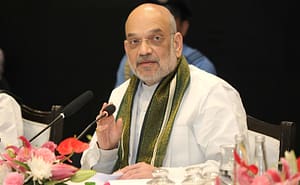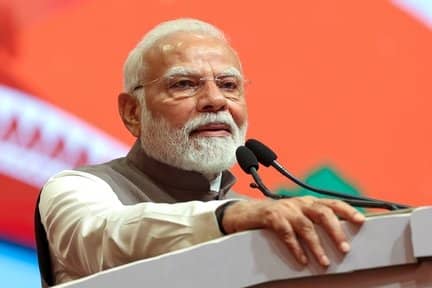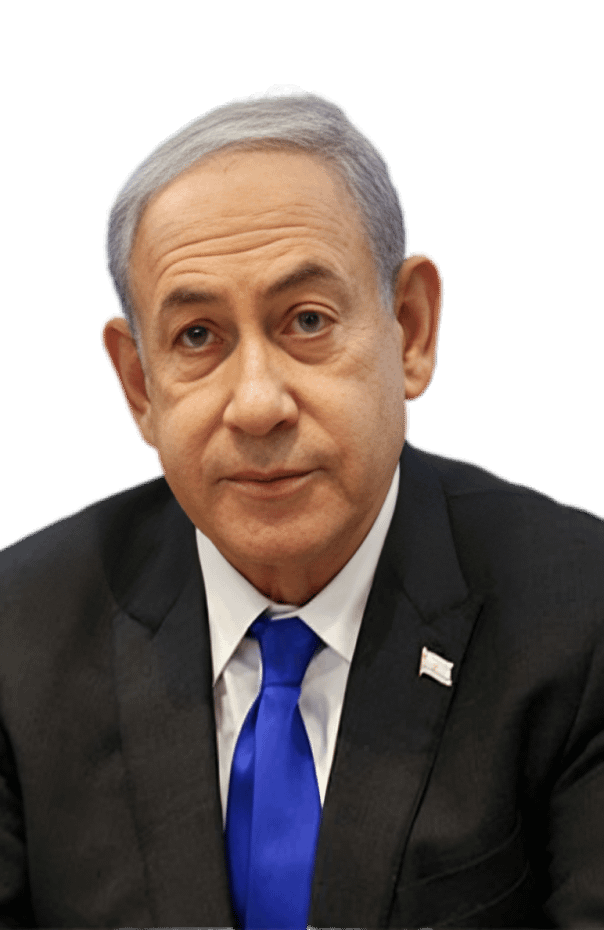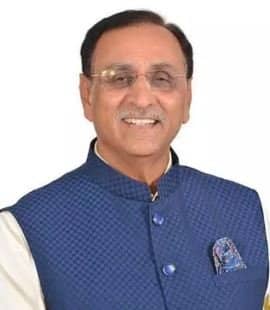- Introduction: The Rise of a Political Powerhouse

Amit Anilchandra Shah, born on October 22, 1964, has emerged as one of the most influential and powerful politicians in contemporary India. Known as the modern-day Chanakya of Indian politics, he is the chief strategist behind the meteoric rise of the Bharatiya Janata Party (BJP) in the last two decades. From being a ground-level worker in Gujarat to becoming the Union Home Minister of India and former BJP National President, Shah’s political acumen, organizational skills, and close association with Prime Minister Narendra Modi have shaped the national political narrative.
- Early Life and Education
Amit Shah was born in Mumbai, Maharashtra, into a Gujarati Hindu Baniya family with roots in the small town of Mansa, Gujarat. His father, Anilchandra Shah, was a successful businessman dealing in PVC pipes. From an early age, Amit Shah showed signs of sharp intellect and discipline.
He pursued a Bachelor of Science (B.Sc.) in Biochemistry from C.U. Shah Science College in Ahmedabad. Although he initially joined the family business after graduation, politics had already sparked his interest during his youth.
- Introduction to Politics: The RSS and ABVP Connection
Amit Shah’s entry into politics began with his association with the Rashtriya Swayamsevak Sangh (RSS) at the age of 14. The values and ideology of the RSS left a lasting impact on his mindset. His political grooming started during his college years when he joined the Akhil Bharatiya Vidyarthi Parishad (ABVP), the student wing of the RSS.
In the early 1980s, he transitioned to the Bharatiya Janata Yuva Morcha (BJYM), the youth wing of the BJP. It was during this period that Shah started building grassroots networks and honed his skills in organizational management, eventually leading to his formal entry into active politics.
- The Modi-Shah Partnership: A Defining Relationship
A defining aspect of Amit Shah’s political journey is his partnership with Narendra Modi. The duo first came into close contact in the late 1980s and 1990s when Modi was rising within the BJP’s Gujarat unit. Their shared ideological beliefs and complementary working styles forged a formidable partnership.
When Modi became Chief Minister of Gujarat in 2001, Shah was one of his most trusted lieutenants. He served in various ministerial positions in the Gujarat government from 2002 to 2010, including portfolios such as Home, Transport, Law and Parliamentary Affairs, and Border Security. His performance in these roles showcased his administrative ability and command over law and order issues.
- Controversy and Legal Troubles
Amit Shah’s political career hasn’t been without controversies. In 2010, he was arrested in connection with the Sohrabuddin Sheikh encounter case, accused of ordering an extrajudicial killing. This led to his resignation from the Gujarat Cabinet and a brief period of political exile, during which he was even banned from entering Gujarat.
However, in 2014, the Central Bureau of Investigation (CBI) cleared Shah of all charges, stating there was no evidence to prosecute him. This legal reprieve marked his return to active politics and set the stage for a dramatic national-level role.
- National Politics and BJP Presidency
After Narendra Modi became the Prime Minister in 2014, Amit Shah was appointed as the BJP National President in July 2014. Under his leadership, the party adopted an aggressive election strategy, focusing on micro-management, booth-level outreach, and caste arithmetic. He spearheaded the Mission 272+ campaign, which was instrumental in the BJP’s historic win in the 2014 general elections.
As BJP President (2014–2020), Shah led the party to unprecedented success in various state assembly elections, including Uttar Pradesh (2017), Assam (2016), Haryana (2014, 2019), Maharashtra, and Bihar (with alliance). He also expanded the BJP’s presence into states where it previously had minimal influence, such as West Bengal, Odisha, and North-East India.
- Organizational Mastery and Election Strategy
Amit Shah is widely regarded as a master strategist. His approach to elections involves meticulous planning, data-driven decisions, and grassroots-level coordination. Some of his notable strategies include:
- Booth Management: Focused on appointing “Panna Pramukhs” (page in-charges) for every voter list page.
- Use of Technology: Leveraged digital tools, data analytics, and social media outreach effectively.
- Cadre Training: Built a strong, ideologically committed cadre base.
- Coalition Building: Formed smart alliances where needed, while maintaining ideological clarity.
His slogan “Congress Mukt Bharat” (Congress-free India) became a campaign centerpiece, driving an aggressive push for BJP’s expansion.
- The 2019 General Elections and Beyond
In the 2019 Lok Sabha elections, the BJP under Amit Shah’s leadership secured an even larger majority than in 2014, winning 303 seats on its own. Shah himself contested and won from the Gandhinagar constituency in Gujarat, a seat previously held by BJP veteran L. K. Advani.
After the election victory, Shah was appointed as the Union Minister of Home Affairs in Modi’s second term. His transition from party organization to governance reflected the trust and confidence PM Modi had in him.
- Major Policy Initiatives as Home Minister
As the Home Minister, Amit Shah has overseen several transformative and controversial policy decisions:
- a) Abrogation of Article 370
On August 5, 2019, Shah announced the abrogation of Article 370, which granted special status to Jammu & Kashmir. This move bifurcated the state into two Union Territories: Jammu & Kashmir and Ladakh. The decision was both hailed and criticized nationally and internationally, but it marked a major ideological victory for the BJP.
- b) Citizenship Amendment Act (CAA)
The passage of the CAA in 2019 under his leadership was another major initiative. The Act offered citizenship to persecuted minorities from Pakistan, Bangladesh, and Afghanistan. It sparked nationwide protests and debates, especially regarding the National Register of Citizens (NRC).
- c) Strengthening Internal Security
Shah focused on internal security, especially in Left-Wing Extremism (LWE)-affected areas and northeastern insurgency. His ministry claimed successes in improving law and order in Kashmir and reducing terror incidents.
- Expanding the BJP Footprint
Under Shah’s strategic vision, the BJP transformed into the world’s largest political party in terms of membership. He emphasized strengthening booth-level committees and created a multi-layered organizational structure that reached every corner of India.
He was also behind the BJP’s North-East Democratic Alliance (NEDA), helping the party form governments in Assam, Tripura, Arunachal Pradesh, and Manipur—regions once considered impenetrable for the BJP.
- Personal Life and Personality Traits
Amit Shah is known to be a private and disciplined individual, maintaining a low public profile despite his powerful political stature. He is married to Sonal Shah, and the couple has a son, Jay Shah, who is currently the Secretary of the Board of Control for Cricket in India (BCCI).
Shah is an avid reader and enjoys historical and political literature. His speeches are typically sharp, focused, and ideologically driven. He is multilingual and speaks Hindi, Gujarati, and English fluently.
- Public Image and Criticism
Amit Shah is both admired and criticized across political and public domains. Supporters see him as a visionary strategist, loyal nationalist, and uncompromising administrator. Critics, however, label him as authoritarian, accusing him of centralizing power and suppressing dissent.
His role in controversial decisions such as CAA, NRC, and handling of Kashmir has made him a polarizing figure in Indian politics.
- Awards, Honors, and Legacy
Though Shah does not boast of formal awards, his political journey and achievements are often compared to legendary political strategists. His leadership helped transform the BJP from a national party into a political juggernaut with unmatched electoral success.
He is expected to remain a pivotal figure in shaping India’s political direction for years to come.
- Recent Developments and Future Prospects
As of 2024–2025, Amit Shah continues to hold the position of Union Home Minister, playing a central role in national governance and BJP’s future electoral planning. He is widely seen as the second-most powerful person in India after PM Modi and is often speculated to be a possible successor to the Prime Minister in the future.
His ability to deliver results, handle complex situations, and manage party affairs places him at the heart of India’s political ecosystem.
- Conclusion: Architect of BJP’s New Era
Amit Shah’s biography is a story of vision, strategy, and resilience. From a student leader in Gujarat to India’s Home Minister and the mastermind behind BJP’s electoral dominance, his journey reflects the transformation of Indian politics itself. Whether loved or criticized, Amit Shah has left a profound imprint on India’s democracy, shaping its direction, discourse, and destiny in the 21st century.



